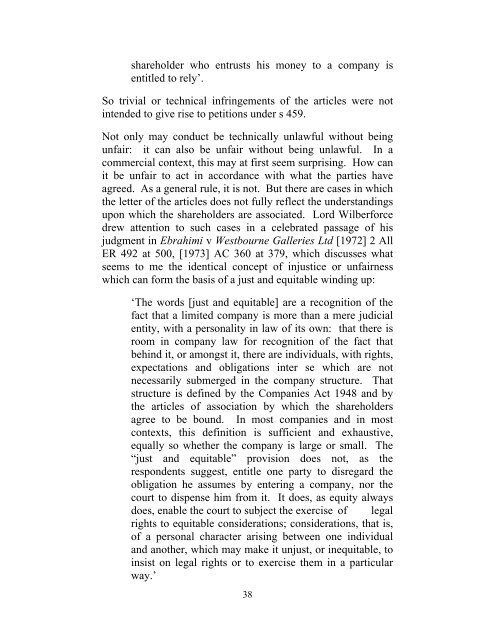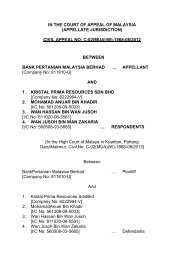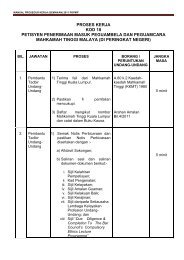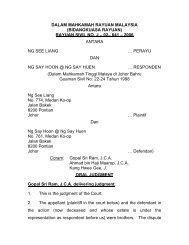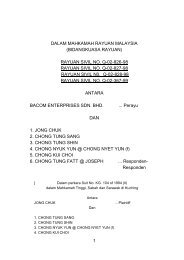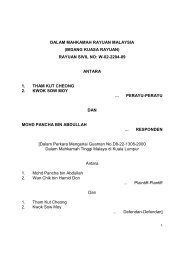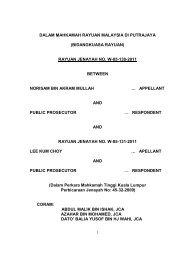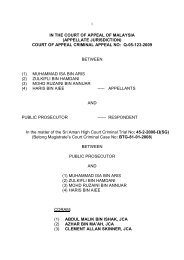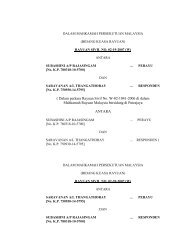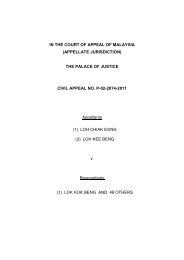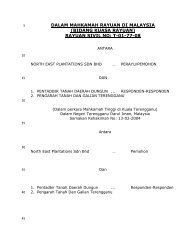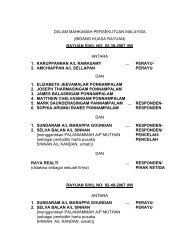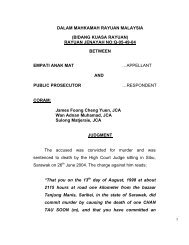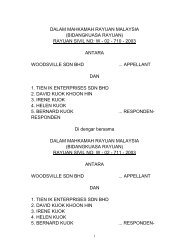in the court of appeal malaysia (appellate jurisdiction)
in the court of appeal malaysia (appellate jurisdiction)
in the court of appeal malaysia (appellate jurisdiction)
Create successful ePaper yourself
Turn your PDF publications into a flip-book with our unique Google optimized e-Paper software.
shareholder who entrusts his money to a company is<br />
entitled to rely’.<br />
So trivial or technical <strong>in</strong>fr<strong>in</strong>gements <strong>of</strong> <strong>the</strong> articles were not<br />
<strong>in</strong>tended to give rise to petitions under s 459.<br />
Not only may conduct be technically unlawful without be<strong>in</strong>g<br />
unfair: it can also be unfair without be<strong>in</strong>g unlawful. In a<br />
commercial context, this may at first seem surpris<strong>in</strong>g. How can<br />
it be unfair to act <strong>in</strong> accordance with what <strong>the</strong> parties have<br />
agreed. As a general rule, it is not. But <strong>the</strong>re are cases <strong>in</strong> which<br />
<strong>the</strong> letter <strong>of</strong> <strong>the</strong> articles does not fully reflect <strong>the</strong> understand<strong>in</strong>gs<br />
upon which <strong>the</strong> shareholders are associated. Lord Wilberforce<br />
drew attention to such cases <strong>in</strong> a celebrated passage <strong>of</strong> his<br />
judgment <strong>in</strong> Ebrahimi v Westbourne Galleries Ltd [1972] 2 All<br />
ER 492 at 500, [1973] AC 360 at 379, which discusses what<br />
seems to me <strong>the</strong> identical concept <strong>of</strong> <strong>in</strong>justice or unfairness<br />
which can form <strong>the</strong> basis <strong>of</strong> a just and equitable w<strong>in</strong>d<strong>in</strong>g up:<br />
‘The words [just and equitable] are a recognition <strong>of</strong> <strong>the</strong><br />
fact that a limited company is more than a mere judicial<br />
entity, with a personality <strong>in</strong> law <strong>of</strong> its own: that <strong>the</strong>re is<br />
room <strong>in</strong> company law for recognition <strong>of</strong> <strong>the</strong> fact that<br />
beh<strong>in</strong>d it, or amongst it, <strong>the</strong>re are <strong>in</strong>dividuals, with rights,<br />
expectations and obligations <strong>in</strong>ter se which are not<br />
necessarily submerged <strong>in</strong> <strong>the</strong> company structure. That<br />
structure is def<strong>in</strong>ed by <strong>the</strong> Companies Act 1948 and by<br />
<strong>the</strong> articles <strong>of</strong> association by which <strong>the</strong> shareholders<br />
agree to be bound. In most companies and <strong>in</strong> most<br />
contexts, this def<strong>in</strong>ition is sufficient and exhaustive,<br />
equally so whe<strong>the</strong>r <strong>the</strong> company is large or small. The<br />
“just and equitable” provision does not, as <strong>the</strong><br />
respondents suggest, entitle one party to disregard <strong>the</strong><br />
obligation he assumes by enter<strong>in</strong>g a company, nor <strong>the</strong><br />
<strong>court</strong> to dispense him from it. It does, as equity always<br />
does, enable <strong>the</strong> <strong>court</strong> to subject <strong>the</strong> exercise <strong>of</strong> legal<br />
rights to equitable considerations; considerations, that is,<br />
<strong>of</strong> a personal character aris<strong>in</strong>g between one <strong>in</strong>dividual<br />
and ano<strong>the</strong>r, which may make it unjust, or <strong>in</strong>equitable, to<br />
<strong>in</strong>sist on legal rights or to exercise <strong>the</strong>m <strong>in</strong> a particular<br />
way.’<br />
38


